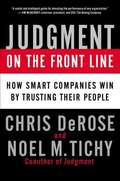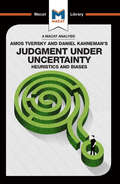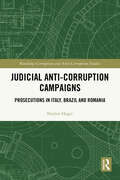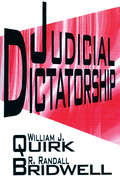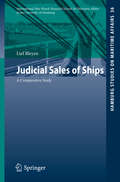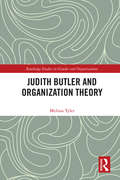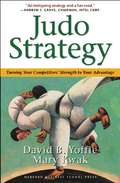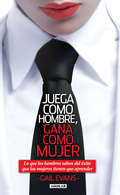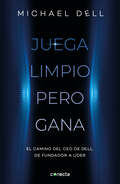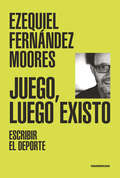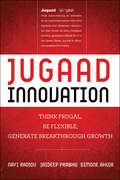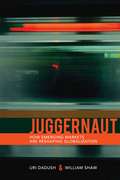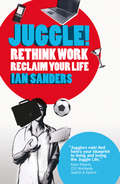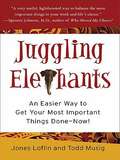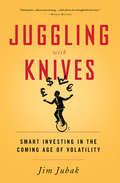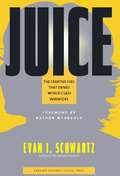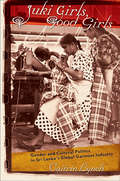- Table View
- List View
Judgment of Paris: California vs. France and the Historic 1976 Paris Tasting That Revolutionized Wine
by George M. TaberThe only reporter present at the mythic Paris Tasting of 1976--a blind tasting where a panel of esteemed French judges chose upstart California wines over France's best--for the first time introduces the eccentric American winemakers and records the tremendous aftershocks of this historic event that changed forever the world of wine.The Paris Tasting of 1976 will forever be remembered as the landmark event that transformed the wine industry. At this legendary contest--a blind tasting--a panel of top French wine experts shocked the industry by choosing unknown California wines over France's best. George M. Taber, the only reporter present, recounts this seminal contest and its far-reaching effects, focusing on three gifted unknowns behind the winning wines: a college lecturer, a real estate lawyer, and a Yugoslavian immigrant. With unique access to the main players and a contagious passion for his subject, Taber renders this historic event and its tremendous aftershocks--repositioning the industry and sparking a golden age for viticulture across the globe. With an eclectic cast of characters and magnificent settings, Judgment of Paris is an illuminating tale and a story of the entrepreneurial spirit of the new world conquering the old.
Judgment on the Front Line: How Smart Companies Win by Trusting Their People
by Noel M. Tichy Chris DeroseFront-line employees can be your greatest asset-here's how to tap their rich vein of insight and leadership. Front-line employees who deal directly with customers are the face of any organization. Not only do they have the most impact on how a brand is perceived, but they are also the most valuable source of insight into what customers want and how to give it to them. Unfortunately, as management experts Chris DeRose and Noel M. Tichy explain, most organizations don't know how to evaluate the risk of giving employees more autonomy. Many of those who are willing to try haven't even invested resources in ensuring that-once the shackles are off-front-line employees make good judgments. Tichy and DeRose offer powerful examples of front-line leadership, such as: How Zappos trusts its people to do anything in service of a customer, including providing free product or reimbursing for mistakes How Mayo Clinic of Arizona enabled its nurses to challenge the hierarchy in order to improve patient car Judgment on the Front Line was the Winner in the Business: Management & Leadership category for the 2013 International Book Awards. The book also won a Silver medal in the Axiom Business Book Award contest. .
Judgment under Uncertainty: Heuristics and Biases
by William J. Jenkins Camille MorvanAmos Tversky and Daniel Kahneman’s 1974 paper ‘Judgement Under Uncertainty: Heuristics and Biases’ is a landmark in the history of psychology. Though a mere seven pages long, it has helped reshape the study of human rationality, and had a particular impact on economics – where Tversky and Kahneman’s work helped shape the entirely new sub discipline of ‘behavioral economics.’ The paper investigates human decision-making, specifically what human brains tend to do when we are forced to deal with uncertainty or complexity. Based on experiments carried out with volunteers, Tversky and Kahneman discovered that humans make predictable errors of judgement when forced to deal with ambiguous evidence or make challenging decisions. These errors stem from ‘heuristics’ and ‘biases’ – mental shortcuts and assumptions that allow us to make swift, automatic decisions, often usefully and correctly, but occasionally to our detriment. The paper’s huge influence is due in no small part to its masterful use of high-level interpretative and analytical skills – expressed in Tversky and Kahneman’s concise and clear definitions of the basic heuristics and biases they discovered. Still providing the foundations of new work in the field 40 years later, the two psychologists’ definitions are a model of how good interpretation underpins incisive critical thinking.
Judicial Anti-Corruption Campaigns: Prosecutions in Italy, Brazil and Romania (Routledge Corruption and Anti-Corruption Studies)
by Nedim HogicThis book offers a comparative analysis of cases of mass prosecutions for political corruption in Italy, Brazil, and Romania.The book outlines how judicial showdowns with political corruption emerge, what consequences they create, and whether they can be considered legitimate judicial operations or coups orchestrated by political forces with the assistance of the judiciary. Due to the similarities exhibited in the legal, political, and economic spheres of the events, the book explores the Italian Mani Pulite, Brazilian Lava Jato, and Romanian judicial anti-corruption campaigns. These campaigns were simultaneously legal operations, narratives created by the media, and opportunities for the emergence of new political actors. The book demonstrates why judicial activity was a crucial tool for reducing and preventing corruption in these countries. In addition to investigating the key legal issues and narratives, the book explores the controversies of these campaigns and assesses whether they should be seen as judicial revolutions or cases of prosecutorial overreach.Providing a holistic comparative assessment of judicial means as a tool for controlling corruption, this book will be of interest to academics in the fields of Corruption Studies, Law, Development Studies, and Political Science.
Judicial Dictatorship
by William J. Quirk Randall BridwellAmerican society has undergone a revolution within a revolution. Until the 1960s, America was a liberal country in the traditional sense of legislative and executive checks and balances. Since then, the Supreme Court has taken on the role of the protector of individual rights against the will of the majority by creating, in a series of decisions, new rights for criminal defendants, atheists, homosexuals, illegal aliens, and others. Repeatedly, on a variety of cases, the Court has overturned the actions of local police or state laws under which local officials are acting. The result, according to Quirk and Birdwell, is freedom for the lawless and oppression for the law abiding. 'Judicial Dictatorship' challenges the status quo, arguing that in many respects the Supreme Court has assumed authority far beyond the original intent of the Founding Fathers. In order to avoid abuse of power, the three branches of the American government were designed to operate under a system of checks and balances. However, this balance has been upset. The Supreme Court has become the ultimate arbiter in the legal system through exercise of the doctrine of judicial review, which allows the court to invalidate any state or federal law it considers inconsistent with the constitution. Supporters of judicial review believe that there has to be a final arbiter of constitutional interpretation, and the Judiciary is the most suitable choice. Opponents, Thomas Jefferson and Abraham Lincoln among them, believed that judicial review assumes the judicial branch is above the other branches, a result the Constitution did not intend. The democratic paradox is that the majority in America agreed to limit its own power. Jefferson believed that the will of the majority must always prevail. His faith in the common man led him to advocate a weak national government, one that derived its power from the people. Alexander Hamilton, often Jefferson's adversary, lacking such faith, feared "the amazing violence and turbulence of the democratic spirit." This led him to believe in a strong national government, a social and economic aristocracy, and finally, judicial review. This conflict has yet to be resolved. 'Judicial Dictatorship' discusses the issue of who will decide if government has gone beyond its proper powers. That issue, in turn, depends on whether the Jeffersonian or Hamiltonian view of the nature of the person prevails. In challenging customary ideological alignments of conservative and liberal doctrine, 'Judicial Dictatorship' will be of interest to students and professionals in law, political scientists, and those interested in U.S. history.
Judicial Sales of Ships
by Lief BleyenThis work focuses on a specific aspect of the enforcement of maritime claims, namely judicial sales of ships, a procedure creditors typically resort to in the event of an irreversible default situation. A substantial part of the book approaches the topic from a comparative perspective, the goal being to assess the similarities and differences of the judicial sale procedure between three specific jurisdictions: Belgium, the Netherlands, and England & Wales. In this study, the comparison is used to further analyse the impacts of these differences on the effectiveness and reliability of the judicial sale procedure in each jurisdiction and also forms the basis for assessing the feasibility of harmonising judicial sale procedures and fostering their acceptance. Considering the international character typical of judicial sales of ships, conflict-of-law questions are very likely to arise during these procedures. Accordingly, the comparative study, where appropriate, is viewed against a private international law background.
Judith Butler and Organization Theory (Routledge Studies in Gender and Organizations)
by Melissa Tyler2020 will mark thirty years since the first publication of Judith Butler’s ground-breaking book, Gender Trouble. Here, and in subsequent work, Butler argues that gender and other forms of identity can best be understood as performative acts. These acts are what bring our subjectivities into existence, enabling us to be recognized as viable employable social beings, worthy of rights, responsibilities and respect. The three decades since the publication of Gender Trouble have witnessed Butler become one of the most widely cited and controversial figures in contemporary feminist thinking. While it is only in her most recent work that Butler has engaged directly with themes such as work and organization, her writing has profound implications for thinking, and acting, on the relationship between power, recognition and organization. Whilst her ideas have made important in-roads into work, organization and gender studies that are discussed here, there is considerable scope to explore further avenues that her concepts and theories open up. These inroads and avenues are the focus of this book. Judith Butler and Organization Theory makes a substantial contribution to the analysis of gender, work and organization. It not only covers central issues in Butler’s work, it also offers a close reading of the complexities and nuances in her thought. It does so by ‘reading’ Butler as a theorist of organization, whose work resonates with scholars, practitioners and activists concerned to understand and engage with organizational life, organization and organizing. Drawing from a range of illustrative examples, the book examines key texts or ‘moments’ in the development of Butler’s writing to date, positing her as a thinker concerned to understand and address the ways in which our most basic desire for recognition comes to be organized within the context of contemporary labour markets and workplaces. It examines insights from Butler’s work, and the philosophical ideas she draws on, considering the impact of these on work, organization and management studies thus far; it also explores some of the many ways in which her thinking might be mobilized in future, considering what scope there is for a non-violent ethics of organization, and for a (re)assembling of the relationship between vulnerability and resistance within and through organizational politics.
Judo Economics
by Adam Brandenburger Julia KouThe early 1990s saw a new wave of start-ups in the U.S. airline business. One entrant, Kiwi International Air Lines, took to the skies in September 1992 with a strategy of attracting small-business travelers looking to save money but lacking the flexibility to book in advance. Fares were to be pegged to the lowest restricted fares in the market, but offered on an unrestricted basis. Another setting in which entrants have recently sought to capture market share from large, established players is the U.S. credit card industry. In the early 1990s, the industry witnessed an onslaught of new players wooing customers with offers of low interest rates and small or nonexistent fees. This case explores some aspects of the game between small-scale entrants and large-scale incumbents.
Judo Strategy: The Competitive Dynamics of Internet Time
by David B. Yoffie Michael A. CusumanoCompetition on the Internet is creating fierce battles between industry giants and small-scale start-ups. Smart start-ups can avoid those conflicts by moving quickly to uncontested ground and, when that's no longer possible, turning dominant players' strengths against them. Authors David Yoffie from HBS and Michael Cusumano from MIT call this competitive approach judo strategy. They use the Netscape-Microsoft battles to illustrate the three main principles of judo strategy: rapid movement, flexibility, and leverage. In the early part of the browser wars, for instance, Netscape applied the principle of rapid movement by being the first company to offer a free stand-alone browser. This allowed Netscape to build market share fast and to set the market standard. Flexibility became a critical factor later in the browser wars. In December 1995, when Microsoft announced that it would "embrace and extend" competitors' Internet successes, Netscape failed to give way in the face of superior strength. Instead it squared off against Microsoft and even turned down numerous opportunities to craft deep partnerships with other companies. The result was that Netscape lost deal after deal when competing with Microsoft for common distribution channels. Netscape applied the principle of leverage by using Microsoft's strengths against it. Taking advantage of Microsoft's determination to convert the world to Windows or Windows NT, Netscape made its software compatible with existing UNIX systems. While it is true that these principles can't replace basic execution, say the authors, without speed, flexibility, and leverage, very few companies can compete successfully on Internet time.
Judo in Action
by Kenneth Corts Debbie FreierContains four short stories about small firms challenging large firms. Illustrates some of the ideas that have been termed "judo strategy." In each case, one can argue that the small firm attempts to use the large firm's size and incumbency to constrain the large firm and provide an opportunity for the small firm. The four vignettes are: (1) Softsoap pioneers the liquid soap market with little competition, at least initially, from the incumbent bar soap manufacturers; (2) Red Bull creates and dominates the energy drink market with little early competition from incumbent beverage companies; (3) U.K. supermarket chains attempt to enter the retail gasoline market but trigger an aggressive price response from the integrated majors; and (4) Freeserve makes large inroads in the U.K. ISP market against dominant incumbent AOL. Each occurrence demonstrates ideas considered "judo strategy"--situations in which small competitors exploit the size and incumbency of a larger firm to find opportunities to make inroads against the large firm without effective retaliation or defense (just as, some authors argue, a small person can throw a large person with judo techniques by using the larger person's weight and inertia against him).
Juega como hombre, gana como mujer: Lo que los hombres saben del éxito que las mujeres tienen que aprender
by Gail EvansAhora, en su libro Juega como hombre, gana como mujer, Gail Evans revela los secretos para las jugadas de éxito y les enseña a las mujeres, de todos los niveles corporativos, cómo entrar al mundo de los negocios y jugarlo con ventaja. El libro permaneció varios meses en las listas de los más vendidos de The New York Times, Business Week y The Wall Street Journal. Esta obra se ha traducido a más de 18 idiomas con ventas sólidas en todo el mundo.De Gail Evans, autora del bestseller, She Wins, You Win. Un manual honesto y práctico que revela secretos importantes de las relaciones laborales entre hombres y mujeres, de lectura obligada para cada mujer que quiere tomar ventaja de su poder. Las mujeres conforman casi la mitad del mercado laboral hoy en día, pero en el mundocorporativo no comparten la mitad del poder. Sólo cuatro de las 500 compañías de Fortune están dirigidas por mujeres y sólo fue hace algunos años que la mitad de esas compañías contrataron a una mujer para altos cargos. ¿La razón? La mayoría de las mujeres nunca aprenden cómo jugar el juego de los negocios. A lo largo de su carrera en la industria de los medios -dominada por hombres- Gail Evans, una de las ejecutivas más poderosas de Estados Unidos, ha conocido a innumerables mujeres que le dicen que se sienten perdidas en su ambiente laboral, casi como si estuvieran jugando sin conocer las reglas del juego. Ella les dice que ese es exactamente el problema: los negocios son un juego, hay reglas para ganar. Gail ha descubierto que, en su mayoría, las mujeres no las conocen. Los hombres conocen las reglas porque ellos las escribieron, pero las mujeres se sienten alejadas del proceso porque no saben cuándo levantar la voz, cuándo pedir responsabilidades, qué decir en una entrevista y muchos otros movimientos clave que pueden hacer o deshacer su carrera. Compartiendo con humor sus años aleccionadores en la vida corporativa, la autora da a las lectoras herramientas prácticas para tomar las decisiones correctas en el trabajo. Entre las reglas que aprenderás están:-Cómo llevar el marcador en el trabajo. -Cuándo tomar un riesgo. -Cómo lidiar con el Síndrome Impostor. -Diez palabras que significan cosas diferentes para hombres y para mujeres. -Por qué los hombres pueden jugar sucio y tú no. -Cuándo renunciar.
Juega limpio pero gana: El camino del CEO de DELL, de fundador a lider
by Michael DellBESTSELLER DE WALL STREET JOURNAL LA HISTORIA JAMÁS CONTADA DE LAS BATALLAS QUE DEFINIERON COMO LÍDER A MICHAEL DELL, EL RENOMBRADO FUNDADOR Y CEO DE UNA DE LAS MÁS GRANDES EMPRESAS ESTADOUNIDENSES. En 1984, Michael Dell, quien pronto abandonaría la universidad, escondió las señales de su incipiente negocio de computadoras en el baño de su habitación en la Universidad de Texas. Casi 30 años después, en la cima del éxito como fundador y líder deDell Technologies, se encontró embrollado en una batalla por la supervivencia de su compañía. Su siguiente movimiento podría asegurar su legado o destruirlo completamente. Juega limpio pero gana es un recuento de tres guerras que peleó por Dell Technologies: una para lanzarla, otra para mantenerla y otra para transformarla. Por primera vez, Dell revela los altibajos de la evolución de la compañía en una industria en constante y rápido cambio, al mismo tiempo que las propias en su proceso de madurez para convertirse en el CEO que se necesitaba. Con humor y humildad, recuerda a los mentores que le mostraron cómo transformar su pasión en un negocio; los competidores que se volvieron sus amigos, adversarios o ambos; y los tiburones que lo acechaban en busca de alguna debilidad para aprovecharla. El resultado es una visión a largo plazo en la que se sustenta su éxito: la tecnología se trata, en definitiva, sobre la gente y su potencial. Más que un retrato honesto de un líder en medio de una encrucijada, Juega limpio pero gana es la historia real que prueba que aunque cualquiera con intuición tecnológica y pasión empresarial puede construir algo sorprendente, se necesita un líder para construir algo que perdure. Dell Technologies;historia de;Silicon Valley;empresa;startup;gigante de la tecnología;Bill Gates;Nunca pares;Lecciones de liderazgo creativo;Aquí no hay reglas;libro de negocios;autobiografía de un empresario;emprendimiento;cómo emprender una empresa;privatizar una empresa pública;cómo meter tu empresa a la bolsa;retos empresariales;liderazgo;características de un líde;mentalidad de tiburon;como triunfar en los negocios;triunfando como siempre;ser empresario joven;el arte de la guerra;ser alguien exitoso;como tener exito en la vidar
Juego, luego existo: Escribir el deporte
by Ezequiel Fernández MooresCuatro décadas deporte local y mundial narrados y analizados por el periodista más respetado y prestigioso. A 10.000 kilómetros de distancia de Madrid, donde resido, un periodista me convoca desde hace años. Resulta alentador el encuentro con Fernández Moores y sus columnas. Incluso en las escasas veces que no coincido con su opinión, lo leo con gratitud, en primer lugar por el respeto con el que trata a los lectores. Sus opiniones son firmes, pero no dogmáticas. Su interés por los datos es tan relevante como su desinterés por la demagogia. Su estilo, sucinto y contundente, desestima la retórica en favor de una claridad admirable. Sus columnas no deleitan, exigen. Requieren que el lector abandone el confort y reflexione sobre un mundo que en muchos aspectos marcha decididamente mal. Fernández Moores escribe en las páginas de deportes, pero su pulsión periodística es universal. Trata el deporte, y fundamentalmente el fútbol, con la seriedad que merece, cualidad cada vez más infrecuente. Para Ezequiel Fernández Moores el fútbol, el deporte en general, es un asunto muy serio. No se equivoca. Tampoco se equivoca cuando nos transmite sus preocupaciones con estilo y rigor. No conozco un periodista latinoamericano que cultive más y mejor los datos en sus columnas. Su trabajo no es fácil. Fernández Moores considera, con razón, que se está arrebatando el fútbol a la gente, al pueblo llano, y que se está utilizando a la gente con fines poco confesables. En sus columnas asoma el amor por un juego maravilloso y su rechazo a todas las formas de corrupción, violencia y engaño que habitan en el fútbol. En una época de regresión crítica y falsedades digeribles, Fernández Moores nos recuerda el papel del periodismo como elemento esencial de contrapoder. La magnitud de su importancia se manifiesta en el trascendente valor de su trabajo. Fernández Moores logra el pequeño milagro de conectar la mirada milimétrica del entomólogo con una visión universal del deporte. Es una característica de gran periodista, de periodista necesario, uno de los pocos que convocan a su audiencia sin importar ciudad, país o continente.Santiago Segurola
Jugaad Innovation: Think Frugal, Be Flexible, Generate Breakthrough Growth
by Simone Ahuja Jaideep Prabhu Navi Radjou"Jugaad Innovation is the most comprehensive book yet to appear on the subject [of frugal innovation]." —The Economist A frugal and flexible approach to innovation for the 21st century Innovation is a key directive at companies worldwide. But in these tough times, we can't rely on the old formula that has sustained innovation efforts for decades—expensive R&D projects and highly-structured innovation processes. Jugaad Innovation argues the West must look to places like India, Brazil, and China for a new approach to frugal and flexible innovation. The authors show how in these emerging markets, jugaad (a Hindi word meaning an improvised solution born from ingenuity and cleverness) is leading to dramatic growth and how Western companies can adopt jugaad innovation to succeed in our hypercompetitive world. Outlines the six principles of jugaad innovation: Seek opportunity in adversity, do more with less, think and act flexibly, keep it simple, include the margin, and follow your heart Features twenty case studies on large corporations from around the world—Google, Facebook, 3M, Apple, Best Buy, GE, IBM, Nokia, Procter & Gamble, PepsiCo, Tata Group, and more—that are actively practicing jugaad innovation The authors blog regularly at Harvard Business Review; their work has been profiled in BusinessWeek, MIT Sloan Management Review, The Financial Times, The Economist, and more Filled with previously untold and engaging stories of resourceful jugaad innovators and entrepreneurs in emerging markets and the United States This groundbreaking book shows leaders everywhere why the time is right for jugaad to emerge as a powerful business tool in the West—and how to bring jugaad practices to their organizations.
Jugad - Kalpak Sanshodhanasathicha Nava Drushtikon: जुगाड: कल्पक संशोधनासाठीचा नवा दृष्टिकोन
by Simone Ahuja Jaideep Prabhu Navi Radjou"जुगाड: कल्पक संशोधनासाठीचा नवा दृष्टिकोन" हे पुस्तक नवी राजू, जयदीप प्रभू, आणि सिमॉन आहुजा यांनी लिहिले आहे आणि संध्या रानडे यांनी मराठीत अनुवादित केले आहे. पुस्तकाच्या प्रस्तावनेत, आर. एन. टाटा यांनी सांगितले आहे की, आधुनिक काळात कंपन्यांना अशा समस्यांना सामोरे जावे लागते ज्यांची त्यांनी कल्पना केली नव्हती. यशस्वी होण्यासाठी, कल्पक संशोधन आवश्यक आहे. पुस्तकात 'जुगाड' या संकल्पनेवर आधारित आहे, ज्याचा अर्थ आहे "निकड भागवण्यासाठी सहज सोप्या पद्धतीने आणि हुशारीने केलेले कल्पक संशोधन." हे संशोधन कमी संसाधनांच्या वापरातून अधिक उत्पन्न कसे मिळवावे यावर लक्ष केंद्रित करते. भारतातील ग्रामीण भागातील लोकांनी, त्यांच्या सभोवतालच्या समस्यांवर सहज आणि सोपे उपाय शोधले आहेत, ज्यामध्ये त्यांनी जुगाड-तत्त्वांचा वापर केला आहे. पुस्तकाचे उद्दिष्ट आहे की, या तत्त्वांचा वापर करून भारतीय कंपन्यांनी आणि उद्योजकांनी त्यांच्या संशोधन पद्धतींमध्ये सुधारणा करावी आणि त्यातून उत्तम परिणाम साधावा. पुस्तकाच्या लेखकांनी जुगाडचे सहा तत्त्वे सांगितले आहेत: कठीण परिस्थितीतही नव्या संधींचा शोध घ्या, कमतरतेतून विपुलता निर्माण करा, विचार आणि कार्यपद्धती यांच्यात लवचीकपणा जपा, साधेपणाला प्राधान्य द्या, वंचितांचा विचार मनात ठेवा, आणि स्वतःच्या मनाचे ऐका. हे पुस्तक भारतातील आणि विकसनशील देशांतील उद्योगजगताच्या दृष्टीने महत्त्वाचे ठरते, कारण ते काटकसर आणि लवचीकता यांचा प्रभावी वापर करून विकास साधण्यासाठी मार्गदर्शन करते.
Juggernaut
by William Shaw Uri DadushAgainst the long sweep of economic history, the current moment is special. Living standards advanced so rapidly and across so many countries over the last decade that it is difficult to think of parallels-even the deepest recession since the Great Depression did not halt progress.In Juggernaut, Uri Dadush and William Shaw explore the rise of developing countries and how they will reshape the economic landscape. Dadush and Shaw project that the global economy will more than triple over the next forty years and the advance of a large group of developing countries-home to most of the world's population but seen as supplicants rather than trendsetters less than a generation ago-will drive this improvement. The authors systematically examine the effects of this seismic shift on the main avenues of globalization-trade, finance, migration, and the global commons-and identify the policy options available to leaders in managing the transformation.In the years to come, the rise of emerging economies will likely enhance prosperity but also create great tensions that could slow the process or even stop it in its tracks. Juggernaut calls for leadership by the largest countries in managing these tensions, and underscores the need to cultivate a "global conscience."
Juggle!: Rethink work, reclaim your life
by Ian SandersJuggle! Rethink Work, Reclaim your Life shows people how to carve out a work life that goes beyond a job title; where The Work You is The Real You/ The Best You; where you can mix up your passions and celebrate your multi-dimensional talents. Where there are no limits to what you do, and where you mix up work and play to get the most out of life. The book reveals the insight of leading Jugglers with contributions from Kevin Roberts, CEO Worldwide of Saatchi & Saatchi; Mike Southon, Financial Times columnist and best-selling business author; Gary Vaynerchuk, Wine entrepreneur and Internet celebrity; Roxanne Darling, Hawaii-based coach, speaker, new media advisor and video blogger. Juggle! is for anyone searching for fresh ideas and solutions to re-frame their worklife. "Jugglers Rule! And here’s your blueprint to living and loving the Juggle Life." —Kevin Roberts, CEO Worldwide, Saatchi & Saatchi www.planetjuggle.com
Juggling Elephants
by Jones Loflin Todd MusigWhat do you do when your life feels as busy as a three-ring circus? Juggling Elephants tells a simple but profound story about one man with a universal problem. Mark has too much to do, too many priorities, too much stress, and too little time. As he struggles to balance his many responsibilities without cracking under the pressure, Mark takes a break to attend the circus with his family. There he has a surprising conversation with a wise ringmaster. He leaves with a simple but powerful lesson: Trying to get everything done is like juggling elephants -- impossible. So Mark begins to think about his work, family, and personal life the way a ringmaster thinks about the many acts in a three-ring circus. He discovers that managing his various acts can be fun and easy once he changes his attitude and follows his new friend?s ongoing guidance. Mark soon realizes: ? If you keep trying to juggle elephants, no one, including you, will be thrilled with your performance. ? A ringmaster cannot be in all three rings at once. ? The key to the success of a circus is having quality acts in all three rings. ? Intermission is an essential part of any good circus. Juggling Elephants is a wonderfully lighthearted guide for everyone who feels like they?re about to be squashed. It will help you better focus your time and energy, so you?ll be able to enjoy more of the things that are important to you. Above all, it will teach you how to run your circus, instead of letting the circus run you.
Juggling With Knives: Smart Investing In The Coming Age Of Volatility
by Jim JubakIn his new book, investment expert Jim Jubak explores the "new normal" of market volatility. With remarkable insights into the zeitgeist of financial markets and the economy, Jubak combines the big macro trends with the more mundane aspects of life to depict why volatility is here to stay, why things are not going to get any calmer soon, and how you can make investing decisions to profit off this new reality. He presents a unified picture that extends far beyond a narrow view of financial markets, exploring the consequences of using global central banks--the Federal Reserve, the Bank of Japan, the People's Bank of China, and the European Central Bank--as cash machines; the debt model of growth now used worldwide; and the demographics of aging and the coming war between the young and the old. He also looks at social trends including the anxiety of affluence, particularly the mismatch between the guaranteed cost of education and the uncertainty of future earnings; the real estate "barbell" and the consequences viewing a home as a financial asset and not simply a place to live; and energy, climate, water and food insecurity. Jubak's mission is to teach investors how to stay sane when people think the sky is falling. In showing what is causing all of this volatility, he provides practical solutions for how you can smartly respond, build a portfolio, and profit.
Juice
by Evan I. SchwartzBuilding value in our global economy increasingly demands creating new opportunities and solving new problems. In a nutshell, that's what inventors do. Just as software has driven growth and opened new markets over the past generation, invention is poised to become the X-factor for the future. With a foreword by former Microsoft research chief Nathan Myhrvold, this groundbreaking book takes us inside the laboratories and inside the minds of some of today's leading inventors to demystify the critical process by which they imagine and create.Evan I. Schwartz argues that invention has remained steeped in myth and misunderstanding. We tend to view invention as a byproduct of accidental discovery or supernatural genius rather than what it truly is: a focused quest fueled by a special creativity latent in each of us. Juice juxtaposes the stories of classic inventors with a new breed of innovators, such as hypersonic sound inventor Woody Norris, genomics pioneer Lee Hood, mechanical whiz Dean Kamen, and business systems inventor Jay Walker. Schwartz reveals the brilliant strategies-including pinpointing problems, crossing knowledge boundaries, visualizing results, applying analogies, and embracing failure-that today's inventors use to journey beyond imagination and bring back ideas that can change the world.
Juice Guys (A)
by Joseph B. Lassiter Sharon Fox Cindy RushmoreThe case explores who the customers are for a new beverage product, their desires as customers for this product, and their desires when ordering this product from a local specialty store location.
Jujitsu and the Technologies of the Groundswell: Understanding Social Technologies and Turning Them to Your Advantage
by Charlene Li Josh BernoffYou probably know that the groundswell-the global phenomenon in which people use social media technologies to get the things they need from one another rather than from businesses and institutions-threatens to undermine the control on which many organizations are built. In this chapter, social media strategy leaders Charlene Li and Josh Bernoff show how you can turn the groundswell to your advantage, much the way a jujitsu master turns the force of his opponent's attack into a force for his own defense. They introduce the component technologies of the groundswell and give you the tools you'll need to engage with those technologies-and, ultimately, draw benefit from them. The chapter concludes with the Groundswell Technology Test, a tool that will help you evaluate new social media technologies and decide which ones you should pay attention to and which ones you can safely ignore. This chapter was originally published as Chapter 2 of "Groundswell, Expanded and Revised Edition: Winning in a World Transformed by Social Technologies."
Juki Girls, Good Girls: Gender and Cultural Politics in Sri Lanka's Global Garment Industry
by Caitrin LynchWhen a government program brought garment factories to rural Sri Lanka, women workers found themselves caught between the pressures of a globalizing economy and societal expectations that villages are sanctuaries of tradition. These women learned quickly to resist the characterization of "Juki girls"—female garment workers already established in the urban sector—as vulgar and deracinated, instead asserting that they were "good girls" who could embody the nation's highest ideals of femininity. Caitrin Lynch shows how contemporary Sri Lankan women navigate a complex web of political, cultural, and socioeconomic forces. Drawing on extensive ethnographic research conducted inside export-oriented garment factories and a close examination of national policies intended to ease the way for globalization, Lynch details precisely how gender, nationalism, and globalization influence everyday life in Sri Lanka. This book includes autobiographical essays by garment workers about their efforts to attain the benefits of being seen as "good" while simultaneously expanding the definition of what sort of behavior constitutes appropriate conduct. These village garment workers struggled to reconcile the role thrust upon them as symbols of national progress with the negative public perception of factory workers. Lynch provides the context needed to appreciate the paradoxes that globalization creates while painting a sympathetic portrait of the individuals whose life stories appear in this book.
Julie Tudor Is Not a Psychopath: a hilarious new crime thriller debut for 2025 - meet your unlikely new heroine...If you loved Eleanor Oliphant Is Completely Fine, you will adore this!
by Jennifer Holdich'Murder has no right to be this funny. Imagine Hannibal Lecter as written by Victoria Wood. Perfect for fans of Caroline Kepnes and CJ Skuse' ERIN KELLY'A wickedly funny and darkly compelling debut' JOANNA WALLACEJulie Tudor is NOT a Psychopath.Julie Tudor is 49 and has it all: a fantastic job (well-maintained spreadsheets are the lynchpin of an efficient office), a beautiful house (some may wonder how she got the money for it, but nothing has been proved) and the man of her dreams. Julie Tudor is NOT a Stalker. Sean is 25 and the love of Julie's life. The only problem is, he thinks he's in love with someone else. And Julie Tudor is definitely, definitely NOT a Serial Killer. But Julie has found herself in a similar situation before. And if there's one thing Julie knows, it's how to get rid of the competition... After all, what's a little murder in the name of true love? Readers LOVE Julie Tudor:'From the very first page, I was hooked and unable to put it down' ⭐⭐⭐⭐⭐'What a perfect read!' ⭐⭐⭐⭐⭐'THIS BOOK IS LITERAL INSANITY!!!!' ⭐⭐⭐⭐⭐'This was SO GOOD' ⭐⭐⭐⭐⭐'This one's a must-read!' ⭐⭐⭐⭐⭐
Julie Tudor Is Not a Psychopath: a hilarious new crime thriller debut for 2025 - meet your unlikely new heroine...If you loved Eleanor Oliphant Is Completely Fine, you will adore this!
by Jennifer Holdich'Murder has no right to be this funny. Imagine Hannibal Lecter as written by Victoria Wood. Perfect for fans of Caroline Kepnes and CJ Skuse' ERIN KELLY'A wickedly funny and darkly compelling debut' JOANNA WALLACEJulie Tudor is NOT a Psychopath.Julie Tudor is 49 and has it all: a fantastic job (well-maintained spreadsheets are the lynchpin of an efficient office), a beautiful house (some may wonder how she got the money for it, but nothing has been proved) and the man of her dreams. Julie Tudor is NOT a Stalker. Sean is 25 and the love of Julie's life. The only problem is, he thinks he's in love with someone else. And Julie Tudor is definitely, definitely NOT a Serial Killer. But Julie has found herself in a similar situation before. And if there's one thing Julie knows, it's how to get rid of the competition... After all, what's a little murder in the name of true love? Readers LOVE Julie Tudor:'From the very first page, I was hooked and unable to put it down' ⭐⭐⭐⭐⭐'What a perfect read!' ⭐⭐⭐⭐⭐'THIS BOOK IS LITERAL INSANITY!!!!' ⭐⭐⭐⭐⭐'This was SO GOOD' ⭐⭐⭐⭐⭐'This one's a must-read!' ⭐⭐⭐⭐⭐

